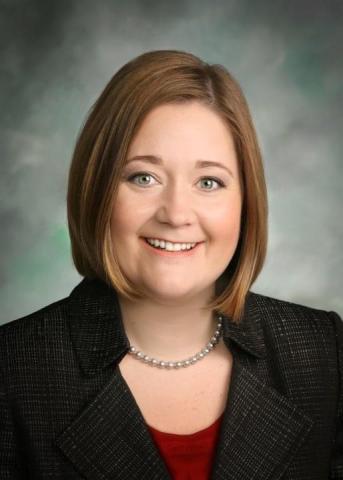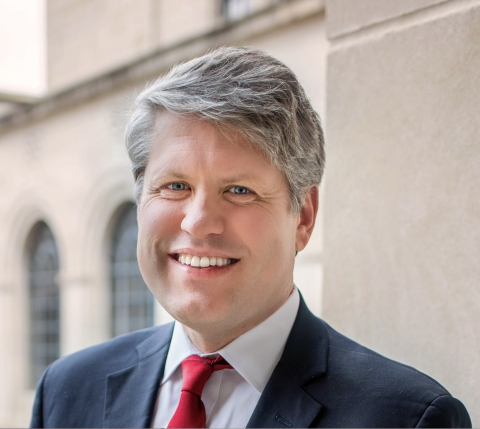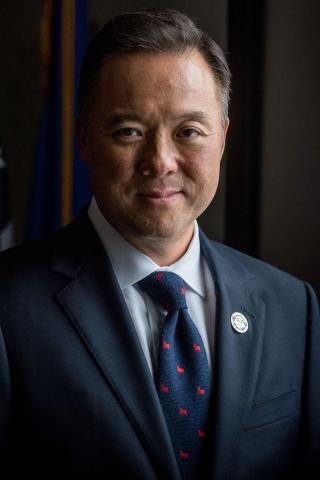Three State AGs, One Law School

Only a few decades ago, state attorneys general were often older lawyers looking for quiet capstones to their careers. They sat in quiet offices where their primary roles were defending the state against lawsuits and giving opinions on pending bills to the governor or lawmakers.
No more.
For a variety of reasons, state attorneys general today hold more influence than ever before. As we have seen in recent years, state AGs can now bring down huge corporations and radically affect the way entire industries do business. They can frustrate, and even halt, federal policy.
Few state offices provide as much latitude for a holder to make real change in the world—or at least their corner of the world. So, it may not be surprising that the University of Chicago Law School has a strong presence among the ranks of current state AGs with three alums, a level matched only by Stanford Law. Republicans Brenna Bird, ’01, and Mike Hilgers, ’04, are the AGs in Iowa and Nebraska, respectively, and Democrat William Tong, ’00, holds the AG office in Connecticut.
Their stories follow, but it may be helpful first to understand how state AGs have evolved to enjoy such growing influence. For that, former Illinois Attorney General Lisa Madigan, a partner at Kirkland & Ellis and a lecturer at the Law School, provides a bit of learned perspective.
She said there are two primary reasons.
First was the landmark 1998 settlement between Big Tobacco and AGs in forty-six states for $206 billion. “This was the prime example of attorneys general working nationwide on a public-health crisis that resulted in a resolution that, quite frankly, the federal government was unable to obtain,” Madigan said. “And you’ve seen that model be used in other circumstances.”
The second factor, Madigan said, is increasing political polarization manifesting itself in Congressional inaction. This has resulted in AGs becoming more proactive in challenging the federal government, often joining forces, in “high-priority policy issues.” The escalation started during the Obama Administration and continued through the Trump and Biden presidencies and will continue, she said. That’s because these AG plaintiffs are winning—a lot. According to the State Litigation and AG Activity Database, Republican AGs beat the Obama Administration in court 64 percent of the time and Democratic AGs claimed an 83 percent win rate against the Trump Administration.
“There is no question that state attorneys general are regularly on the front lines of every significant policy matter that is taking place in this country,” Madigan said. “And their actions, even at a state level, can have an impact on national policy.”
“I’m really proud of the University of Chicago for having so many current state AGs as alums,” she concluded. “It does not surprise me at all, based on the level of political interest and engagement I see among the students.”
Brenna Bird ’01, Iowa
Iowa Attorney General Brenna Bird’s roots in the Hawkeye State are deep. She grew up on a farm near Dexter (population 629), where she and her siblings were homeschooled. Bird and her husband, Bob Bird, ’93, and son live on a farm today.
“Everybody in my family was a farmer or a truck driver or a hairdresser or small business people,” Bird said. “So going to college, let alone law school, was unusual.” She took the step, however, and enrolled at Drake University in Des Moines, thirty miles from home. She majored in political science and history with a minor in Russian, receiving her BA degree in 1997.
By that time, she’d developed an interest in law and public service as the result of her involvement in Republican politics—as a student, she’d volunteered to work on statehouse campaigns—and decided to take the LSAT and apply to law schools.
Bird recalled that when she began her search, she relied on advice that a Drake professor had given her: Since you’ll be spending a lot of money on law school, it’s a good idea to visit the school or schools that have drawn your interest.
“I did that, and Chicago was definitely my favorite,” she said. “The other thing I noticed was that many of the professors I talked with at the other schools who were the most intellectually engaging and thoughtful had Chicago JDs.”
Bird said that one of her most influential experiences as a law student was her involvement in the Institute for Justice Entrepreneurship Clinic, helping entrepreneurs on the South Side start their own businesses. She also got involved in litigation there, “helping to defend smaller taxi companies against the City of Chicago’s overreach and defending them in court.”
After receiving her JD in 2001, Bird spent seven years in Washington as chief of staff for Republican US Representative Steve King. She then returned to Iowa and entered electoral politics for the first time with an unsuccessful run for attorney general, losing to incumbent Tom Miller by eleven points. She then served as legal counsel to Governor Terry Branstad for four years before returning to active political life when she served for two years in Fremont County and then for four years in Guthrie County.
“I think that what sets Chicago apart is that the students are very engaged in ideas, rigorous thought, defending their positions, and thinking things through.” Brenna Bird, ’01
Miller, who had defeated her handily twelve years earlier, was the longest-serving AG in the nation’s history and was seeking his eleventh four-year term. This time, however, Bird’s arguments resonated with Iowa’s voters, and she pulled out a dramatic narrow victory.
Bird promised voters to take a tougher stance on crime in Iowa and has increased the number of prosecutors in her office and launched a cold-case unit. She has also pledged to “make changes in the AG’s office to get it working for Iowa,” and “stand up against federal government over-reach.” She did that, according to the Des Moines Register last year, by bringing numerous lawsuits against the federal government on issues ranging from gun rights to immigration to environmental regulations.
Bird is pleased to be the state’s chief attorney and working for what she considers the best interests of her constituents. She said she is grateful for what she learned at UChicago Law and applies that knowledge every day on the job.
“I think that what sets Chicago apart is that the students are very engaged in ideas, rigorous thought, defending their positions, and thinking things through. I think that rigorous exchange of ideas makes for great lawyers. And it’s certainly made for a meaningful law school experience that has served me well later in life.”
Mike Hilgers ’04, Nebraska
At first, Omaha native Mike Hilgers intended to be a doctor. Medical careers run in the family—his father is an MD, as are a brother and a sister—so when Hilgers enrolled at Baylor University, he took pre-med courses with an eye toward medical school. His plans shifted, however, after graduation in 2001 when he considered medical schools and the likelihood of waitlists. He decided to apply to law schools as somewhat of a backup plan. In the process, he became intrigued by the prospect of becoming a lawyer instead of a doctor, and that is where the Law School entered the picture.
“I wasn’t sure that I ultimately wanted to practice medicine,” Hilger said. “I chose Chicago because of its reputation for intellectual rigor.”
The challenge was everything he could have expected. “The classes were hard—I mean hard,” he recalled. “They were thorough, they were detailed, and they stressed your mental capacity every which way. And the students were brilliant.”
Hilgers learned the value of reasoned discourse when people held opposing views.
“People would be level-headed,” he said. “They wouldn’t overreact and call people names. They wouldn’t get emotional. They wouldn’t ostracize you from their friend groups.”
Hilgers acclimated and realized he wanted to become a practicing litigator and achieved the distinction of being named editor of the University of Chicago Law Review. After receiving his JD in 2004, Hilgers landed a one-year clerkship with Judge Edith Brown Clement at the Fifth US Circuit Court of Appeals.
He then joined the law firm of Fish & Richardson, handling complex commercial litigation in its Dallas office and gaining significant trial experience. He got married to another lawyer who was from East Texas and whom he had initially met at Baylor. The couple made plans to move back to his Nebraska turf to raise a family.
A self-described entrepreneur who had launched several small businesses, including a catering company in Dallas, Hilgers decided to create a law firm from scratch along with his wife, Heather. That firm, Hilgers Graben, enjoyed explosive growth, expanding to more than 100 lawyers. Heather Hilgers now heads that firm.
Hilgers developed an interest in politics, ran for a legislative seat in 2012, and narrowly lost. In 2014, Attorney General Jon Bruning ran for governor, and Hilgers entered the race to succeed him. He finished third in the Republican primary. He finally entered the win column in 2016 with a successful run for a legislative seat, gained reelection in 2020, and in 2021 won election as the unicameral body’s speaker.
In 2022, Attorney General Doug Peterson announced that he would be returning to private practice, and Hilgers decided to make a second run for the office. This time he won handily, winning 67 percent of the votes in the Republican primary, which ensured election in the heavily Republican state. He won 69 percent of the votes in the general election against his only opponent, from the Legal Marijuana Now party.
Nebraska’s unique unicameral legislature is nonpartisan, meaning there are no official parties within the legislature, and at least theoretically provides equal footings and independent voices for each of its forty-nine members.
“Policy and ideology play an important role, of course,” Hilgers said, “but success is based on relationships and how you treat people. It always reminded me of my experience at the University of Chicago because debate and how you treat people really mattered.”
“I chose Chicago because of its reputation for intellectual rigor. The classes were hard—I mean hard.” Mike Hilgers, ’04
Similarly, Hilgers believes his UChicago Law experience strongly influenced his decision to seek the AG’s office. He recalled that his Constitutional Law classes were the ones that stuck with him the most, and here was a chance to work on issues involving the boundaries of federal vs. state legislative powers. As AG, he regularly cites his commitment to fighting against “federal overreach,” for example.
Hilgers said the personal highlight of his first two years as AG was his involvement in Biden v. Nebraska, the case involving the Biden Administration’s student-loan forgiveness plan. Hilgers took the lead for the six states with Republican AGs who challenged the plan on the grounds that it violated the Constitution’s separation-of-powers provisions. Only Congress has the power to enable a loan-forgiveness program, the AGs argued, and the US Supreme Court agreed in a 6-3 ruling. Hilgers sat second chair in the case.
“There’s no way I could have done that without the University of Chicago,” he said. “I wouldn’t have even had the courage to run for office, but Chicago exposed me to the fact that yeah, you can do these things."
William Tong ’00, Connecticut
Willam Tong made history in 2018, when voters in Connecticut elected him as attorney general. It was the first time an Asian American gained statewide elective office in that state and the first time that a Chinese American was elected as a state AG anywhere in the US.
The grandson of refugees who fled mainland China in 1949 following the Chinese Revolution, Tong grew up in West Hartford along with his three siblings. His father had met and married an immigrant from Taiwan and the couple launched a successful Chinese restaurant, where their children pitched in with cooking and cleaning in the evening and on weekends.
Like many immigrant families, the Tongs valued hard work and education, and William had a vague understanding that he would pursue some kind of professional career. Then, at age 15, Tong had an experience that snapped his future into sharper focus. As a high school student, he’d developed an interest in politics and volunteered for Connecticut Attorney General Joe Lieberman, who was engaged in an uphill battle to unseat incumbent Lowell Weicker for a US Senate seat. Lieberman beat the odds and prevailed, winning by one point.
Tong enrolled at Brown University, where he studied classics and narrowed his career scope. “I would say public service came first and law school came second,” he recalled. “Then my best friend told me that classics majors sort of disproportionately find their way not just to law school, but the good law schools.”
Thus inspired, Tong set about applying to the good law schools and landed acceptance at UChicago. Looking back, Tong said that he was an unexceptional student, but one who loved human interaction—he headed the Jessup International Law Moot Court team among other activities. Not surprisingly, perhaps, he set his career sights on being a litigator and, after receiving his JD in 2000, spent the next eighteen years trying cases in state and federal courts, first for Simpson Thacher & Bartlett in New York City and then Finn Dixon & Herling in Stamford, Connecticut.
“I think that I represent to my colleagues on the other side that I’m open to conversation, that I see them as human beings and colleagues. … I learned that at Chicago." William Tong, ’00
At the same time, Tong began to pursue his longtime interest in politics and public service. In 2006, he won election to the state House of Representatives for the 147th District and went on to serve six terms in that position. Tong became chair of the House Judiciary Committee, which has jurisdiction over the administration of the state’s courts and Tong was its most senior legislator. When Attorney General George Jepsen announced in 2018 that he would not seek reelection, Tong entered the race, became the front runner, and defeated his opponent by eight points.
He said he’ll always remember his first day in office. “I walked in, and within an hour or two my assistant comes in and says, ‘Senator Lieberman is on the phone.’ I pick up the phone and he says, ‘I’m so proud that thirty years later you’re sitting in my office.’ It was one of the greatest moments of my life."
“There is no question that state attorneys general are regularly on the front lines of every significant policy matter that is taking place in this country. And their actions, even at a state level, can have an impact on national policy.” Lisa Madigan, former Illinois Attorney General and lecturer at the Law School
As AG, Tong has made his mark by taking a lead role in the litigation against OxyContin maker Purdue Pharma, resulting in a landmark $7.4 billion settlement. Tong is also now part of a multi-state lawsuit against Meta, accusing the social media company of trying to hook children on its platforms.
Tong said that throughout his work, the lessons he learned at the Law School continue to influence him. “What I valued most about the University of Chicago and the Law School was the academic freedom, and that it was very much a serious place for debate and for sharing new ideas and approaches.”
Tong maintains that state AGs everywhere have more latitude and power than ever due to partisan polarization in Washington. In his own mind, that means that to achieve results at the state level, AGs must be adept at reaching solutions through compromise. And that, he said, is where UChicago Law has been invaluable.
“I think that I represent to my colleagues on the other side that I’m open to conversation, that I see them as human beings and colleagues, and that I come to these conversations with open hands even though I feel very strongly about my position and what I believe is true. I learned that at Chicago.”





